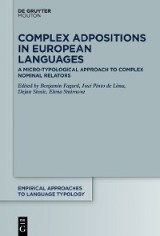Details

Complex Adpositions in European Languages
A Micro-Typological Approach to Complex Nominal RelatorsEmpirical Approaches to Language Typology [EALT], Band 65 1. Aufl.
|
CHF 160.70 |
|
| Verlag: | De Gruyter |
| Format: | |
| Veröffentl.: | 26.10.2020 |
| ISBN/EAN: | 9783110686647 |
| Sprache: | englisch |
| Anzahl Seiten: | 410 |
DRM-geschütztes eBook, Sie benötigen z.B. Adobe Digital Editions und eine Adobe ID zum Lesen.
Beschreibungen
While much attention has been devoted to simple nominal relators, especially prepositions and case markers, complex nominal relators have not yet been the focus of a systematic and cross-linguistic study.
<br>The chapters of this volume provide not only a working definition of such constructions, but also a description of complex adpositions and other complex nominal relators in a variety of European languages, both Indo-European and non-Indo-European, including some languages for which this phenomenon had received little attention, such as Breton and Albanian. Building on synchronic and diachronic corpus-based investigations, the authors show commonalities and specificities of these linguistic items across languages, trying to explain why and how they emerged.
<br>The research presented in this volume confirms the wide-spread use of complex adpositions in Europe, and the data reviewed in the final discussion suggests it might be the same in other parts of the world, as well. This book thus offers not only detailed descriptions of complex nominal relators in fifteen languages, but also indications of what to look for in other languages, and how to distinguish between a syntactically free sequence and a genuine complex nominal relator.
<br>The chapters of this volume provide not only a working definition of such constructions, but also a description of complex adpositions and other complex nominal relators in a variety of European languages, both Indo-European and non-Indo-European, including some languages for which this phenomenon had received little attention, such as Breton and Albanian. Building on synchronic and diachronic corpus-based investigations, the authors show commonalities and specificities of these linguistic items across languages, trying to explain why and how they emerged.
<br>The research presented in this volume confirms the wide-spread use of complex adpositions in Europe, and the data reviewed in the final discussion suggests it might be the same in other parts of the world, as well. This book thus offers not only detailed descriptions of complex nominal relators in fifteen languages, but also indications of what to look for in other languages, and how to distinguish between a syntactically free sequence and a genuine complex nominal relator.
<strong>B. Fagard</strong>, Lattice lab., Paris;
<strong>J. Pinto de Lima</strong>, U. of Lisbon;
<strong>D. Stosic</strong>, U. Toulouse Jean Jaurès, CNRS;
<strong>E. Smirnova</strong>, U. of Neuchâtel.
<strong>J. Pinto de Lima</strong>, U. of Lisbon;
<strong>D. Stosic</strong>, U. Toulouse Jean Jaurès, CNRS;
<strong>E. Smirnova</strong>, U. of Neuchâtel.
Diese Produkte könnten Sie auch interessieren:

American Consumer Culture and its Society: From F. Scott Fitzgerald`s 1920s Modernism to Bret Easton Ellis`1980s Blank Fiction

von: Johannes Malkmes

CHF 64.99
















